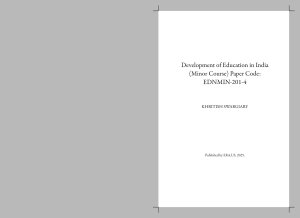Development of Education in India (Minor Course) Paper Code: EDNMIN-201-4
About this ebook
The primary objective of this book is to trace the salient features of Indian education through its various phases, from the spiritual and philosophical foundations of Vedic and Buddhist systems to the transformative policies of the modern era, including the National Education Policy of 2020. By exploring the aims, methods, and societal impacts of education across these periods, this book seeks to equip students with a nuanced perspective on the factors that have influenced India’s educational landscape. It also highlights key milestones, such as the contributions of missionaries in colonial India, the establishment of pivotal education commissions, and the formulation of national policies that continue to guide the country’s educational framework.
The book is structured into four chapters, each addressing a distinct phase of educational development in India. Chapter 1 delves into the ancient and medieval periods, exploring Vedic, Brahmanic, Buddhist, and Islamic education systems, with a special focus on women’s education. Chapter 2 examines the colonial period, detailing the educational activities of missionaries and landmark policies like Macaulay’s Minute and Wood’s Despatch. Chapter 3 covers the post-independence era, analyzing the recommendations of major education commissions. Finally, Chapter 4 discusses the evolution of national education policies from 1968 to 2020, emphasizing their role in fostering equity and quality in education.
This book is the result of extensive research and a commitment to presenting a balanced, scholarly account of India’s educational history. It is designed to engage students, educators, and researchers alike, encouraging critical reflection on the past and its relevance to contemporary educational challenges. I hope this work serves as a valuable resource for students of Bodoland University and beyond, inspiring them to appreciate the dynamic interplay of tradition and modernity in shaping India’s educational journey.
- Khritish Swargiary (2025)








